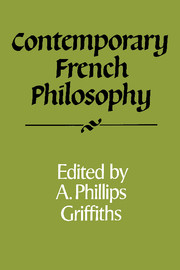Book contents
- Frontmatter
- Contents
- Preface
- Continental Insularity: Contemporary French Analytical Philosophy
- The Misprision of Pragmatics: Conceptions of Language in Contemporary French Philosophy
- Ants and Women, or Philosophy without Borders
- Motifs towards a Poetics
- The Relevance of Cartesianism
- The Enlightenment without the Critique: A Word on Michel Serres' Philosophy
- The Teleological and Deontological Structures of Action: Aristotle and/or Kant?
- The Crisis of the Post-modern Image
- Merleau-Ponty and the Phenomenology of Perception
- Epistemological History: The Legacy of Bachelard and Canguilhem
- History as Genealogy: An Exploration of Foucault's Approach to History
- Beyond Deconstruction?
- Further Adventures of the Dialectic: Merleau-Ponty, Sartre, Althusser
- Paradoxes of the Pineal: From Descartes to Georges Bataille
- Notes on Contributors
- Index
History as Genealogy: An Exploration of Foucault's Approach to History
Published online by Cambridge University Press: 25 May 2010
- Frontmatter
- Contents
- Preface
- Continental Insularity: Contemporary French Analytical Philosophy
- The Misprision of Pragmatics: Conceptions of Language in Contemporary French Philosophy
- Ants and Women, or Philosophy without Borders
- Motifs towards a Poetics
- The Relevance of Cartesianism
- The Enlightenment without the Critique: A Word on Michel Serres' Philosophy
- The Teleological and Deontological Structures of Action: Aristotle and/or Kant?
- The Crisis of the Post-modern Image
- Merleau-Ponty and the Phenomenology of Perception
- Epistemological History: The Legacy of Bachelard and Canguilhem
- History as Genealogy: An Exploration of Foucault's Approach to History
- Beyond Deconstruction?
- Further Adventures of the Dialectic: Merleau-Ponty, Sartre, Althusser
- Paradoxes of the Pineal: From Descartes to Georges Bataille
- Notes on Contributors
- Index
Summary
Anyone familiar with contemporary French culture could not fail to notice that, in the field of ideas, history and the philosophy of history occupy in France a more central place than in England or North America. The work and concerns—including the methodological concerns—of historians like Marc Bloch, Fernand Braudel and the Annalistes, Georges Lefebvre, Emmanuel Le Roy Ladurie, Michel de Certeau, Jacques Le Goff and Francois Furet, are known, discussed and taken on board by most French intellectuals and academics.
One reason for this, I think, is the strong trace left on French thought by Hegelian philosophy and its major progeny, Marxism, two philosophies that stem from a sustained reflection on history. In contrast, in the English-speaking world, where Empiricism and its variants have held sway for so long, historical reflection has tended to be at best an afterthought, no doubt because the starting point of Empiricism is the biological individual rather than the social individual.
Undoubtedly, however, the clearest and most interesting example of this French concern with history is the work of Michel Foucault. Whatever else it may appear to be, Foucault's work is primarily a recurrent dialogue with history, and hardly any ‘philosophy’ Foucault has put forward—on the nature of power, discourse, truth or sexuality—has been produced independently of detailed historical considerations.
Yet, as many will know, Foucault's declared approach to writing history is anything but Hegelian or Marxist.
- Type
- Chapter
- Information
- Contemporary French Philosophy , pp. 157 - 174Publisher: Cambridge University PressPrint publication year: 1989
- 3
- Cited by



